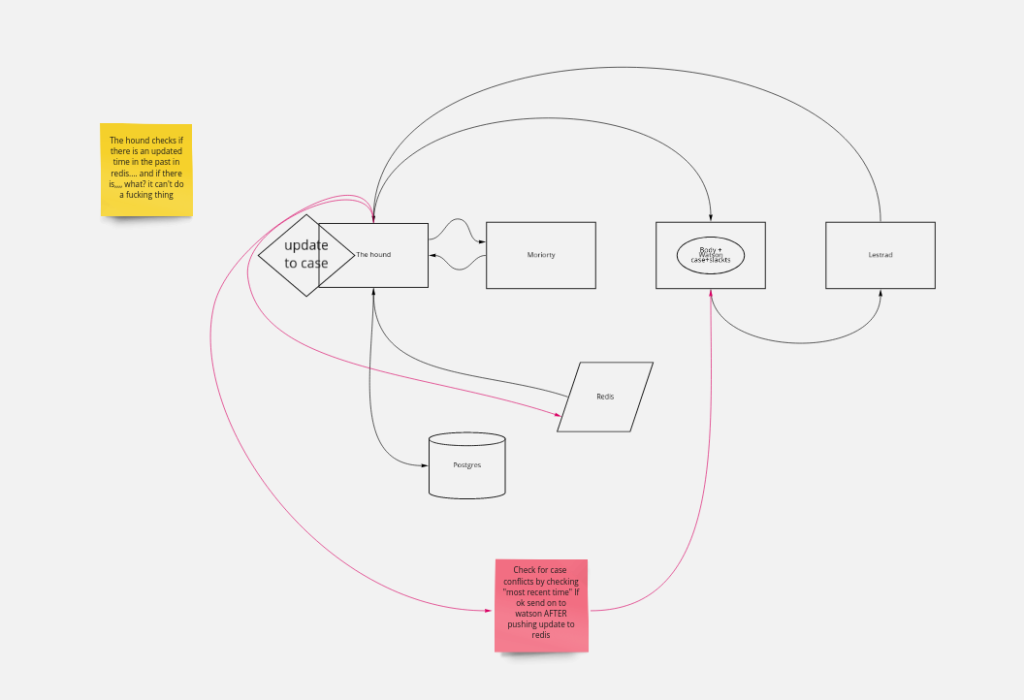For reasons (specifically that my kubenetes hosts have been up and down lately) I have had to harden my deploy.
First thing and the most important was to stop the graceful shutdowns of my rabbitMQ connections. I realised it would be way better to just sleep and retry on _any_ rabbitMQ connection error, particularly if rabbitMQ shut down gracefully.
Previously I was assuming that if rabbitMQ was shutting down gracefully then the whole app was.
How wrong I was, I was informed in no uncertain terms that I should be prepared for individual containers to be shut down and restarted without the whole pod getting a restart.
To that end the following changes were needed:
def getJobs():
l.info("Running get Jobs")
while True:
try:
global connection
global channelM
connection = pika.BlockingConnection(pika.ConnectionParameters('rabbitmq'))
channel = connection.channel()
channelM = connection.channel()
channel.queue_declare(queue=myRabbitQueue)
channel.basic_consume(queue=myRabbitQueue, auto_ack=True, on_message_callback=callback)
l.info("Will now continue to run")
channel.start_consuming()
# Don't recover if connection was closed by broker
except pika.exceptions.ConnectionClosedByBroker:
l.error('Rabbit error connection closed by broker')
break
# Don't recover on channel errors
except pika.exceptions.AMQPChannelError:
l.error('Rabbit error channel error')
break
# Recover on all other connection errors
except pika.exceptions.AMQPConnectionError:
l.error('Retrying rabbitMQ listener')
continueto
def getJobs():
l.info("Running get Jobs")
while True:
try:
global connection
global channelM
connection = pika.BlockingConnection(pika.ConnectionParameters('rabbitmq'))
channel = connection.channel()
channelM = connection.channel()
channel.queue_declare(queue=myRabbitQueue)
channel.basic_consume(queue=myRabbitQueue, auto_ack=True, on_message_callback=callback)
l.info("Will now continue to run")
channel.start_consuming()
# Recover on all other connection errors
except pika.exceptions.AMQPConnectionError:
l.error('Retrying rabbitMQ listener')
continue
except Exception as err:
l.error(f'Error in connecting to rabbitmq, going to retry: {err}')
sleep(5)
Note the removal of the “# Don't recover on channel errors” where it breaks. The Break broke the whole dam run loop!
And this brought me to my next problem. My app just wasn’t shutting down cleanly. After much messing I realised that the entrypoint.sh script (it had a few “wait-for-its” then started and backgrounded my various python modules) was not passing SIGTERM, so my app wasn’t shutting down properly at all.
Because of how it was built, this never mattered, but it always took the 60 seconds to destroy when I was pushing a new version… and it was a bit annoying to have it “not be workin proper” as they say.
So I am moving to supervisord. But if there’s one this I dislike it’s config files. So let me present a “translator” from entrypoint.sh to a supervisord conf file. It’s not perfect, but it beats writing it by hand. I hope someone else finds it useful.
What is confusing to me however, is it always seems so hard do just get simple best practices in deploying a simple-ish python app to kubernetes. I thought the whole point was to make it easier for developers. If I was running my app in a VM I wouldn’t have to care about any of this stuff!
I think the reason for this is I wrote the python app from scratch, and didn’t use a framework that had all the default configs ready to go!
Here’s the helper, I hope it helps:
def generate_supervisord_conf(entrypoint_file):
supervisord_conf = "[supervisord]\n"
supervisord_conf += "nodaemon=true\n"
supervisord_conf += "logfile=/dev/null\n"
supervisord_conf += "logfile_maxbytes=0\n"
supervisord_conf += "user=root\n\n"
programs = []
with open(entrypoint_file, "r") as f:
lines = f.readlines()
for line in lines:
if line.startswith("pipenv run"):
program_name = line.split(" ")[2].rstrip("\n").split("/")[-1].split(".")[0]
programs.append(program_name)
for program in programs:
program_conf = f"[program:{program}]\n"
program_conf += f"command=/usr/local/bin/pipenv run /app/{program}.py\n"
program_conf += "autostart=true\n"
program_conf += "redirect_stderr=true\n"
program_conf += "stdout_logfile=/dev/fd/1\n"
program_conf += "stdout_logfile_maxbytes=0\n"
#program_conf += "depends_on=is_it_up\n" # This is the wait-for-it script
program_conf += "autorestart=true\n\n"
supervisord_conf += program_conf
return supervisord_conf
entrypoint_file = "./entrypoint.sh"
supervisord_conf = generate_supervisord_conf(entrypoint_file)
with open("supervisord.conf", "w") as f:
f.write(supervisord_conf)
I find myself liking programmatic generation more and more!
UPDATE! I forgot about the annoying logging problems when using supervisord… please see https://docs.docker.com/config/containers/multi-service_container/ I have updated the code above



